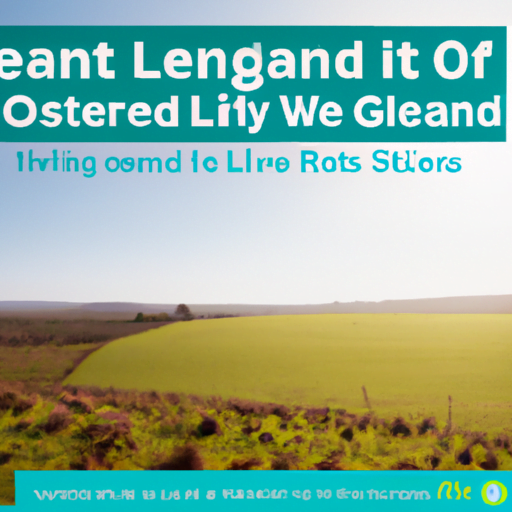So, have you ever wondered if you can buy some land and live off the grid in the UK? You know, like disconnecting from the traditional power grid, growing your own food, and really embracing a self-sufficient lifestyle. Well, my friend, let me tell you that it’s absolutely possible! In fact, more and more people are making the decision to live off grid and have their own little piece of land to call home.
Now, you might be thinking, “Is this legal? Can I just buy a piece of land and set up camp?” Well, it’s not as simple as pitching a tent in the middle of nowhere, but it is definitely doable. You’ll need to do your research and find a suitable piece of land that you can purchase. There are certain planning and zoning regulations that you’ll need to adhere to, but as long as you meet the requirements, you can absolutely live off grid on your own land.
Living off grid offers a whole range of benefits. First and foremost, it’s a great way to reduce your environmental impact and live a more sustainable lifestyle. You’ll have the freedom to generate your own renewable energy, collect rainwater, and grow your own organic food. Plus, you’ll have the opportunity to live in a more remote and peaceful location, away from the hustle and bustle of city life. In our upcoming article, we’ll delve into the details of buying land and living off grid in the UK, so stay tuned for more information!

Understanding Living Off-Grid in the UK
Living off-grid refers to the lifestyle of being self-sufficient and independent from public utilities such as electricity, water, and gas. It involves generating your own energy, growing your own food, and managing your own waste. The off-grid lifestyle has gained popularity in recent years as people seek to reduce their environmental impact, become more self-reliant, and embrace a simpler way of living.
The benefits of living off-grid
Living off-grid offers numerous benefits, both for individuals and the environment. One of the main advantages is the ability to reduce your carbon footprint. By generating your own energy through renewable sources like solar or wind power, you can significantly decrease your reliance on fossil fuels and reduce greenhouse gas emissions.
Another benefit is the opportunity to save money in the long run. While the initial costs of setting up an off-grid system can be significant, over time, you can save on utility bills as you become less dependent on public services. Additionally, by growing your own food and implementing sustainable practices, you can reduce your expenses on groceries and live a more sustainable lifestyle.
Living off-grid also allows for a greater sense of self-sufficiency and independence. By relying on your own resources, you gain a deeper understanding of where your energy, water, and food come from. This sense of empowerment can lead to increased resilience and adaptability in the face of challenges.
Challenges of living off-grid
Living off-grid, however, comes with its own set of challenges. One of the main challenges is obtaining planning permission for off-grid living. In the UK, there are certain restrictions and regulations that need to be taken into account when purchasing land and building an off-grid home. It is crucial to familiarize yourself with the local laws and requirements to ensure a smooth and legal transition to off-grid living.
Another challenge is the initial investment required to set up an off-grid system. The cost of installing solar panels, wind turbines, and other renewable energy sources can be substantial. Additionally, building and maintaining an off-grid home can require specialized skills and knowledge. It is important to assess your budget and capabilities before embarking on an off-grid lifestyle.
Access to essential services and amenities may also be a challenge in off-grid living. Depending on the location of your off-grid property, you may need to install alternative water and sewage systems. It is important to carefully consider the practicalities of accessing clean water, managing waste, and maintaining a sustainable lifestyle while living off-grid.
Exploring the off-grid lifestyle in the UK
While living off-grid may seem daunting, the UK offers a range of opportunities for those interested in this lifestyle. Understanding the legal considerations for buying land is a crucial first step in the process.
Legal Considerations for Buying Land in the UK
Understanding land ownership regulations in the UK
Before purchasing land for off-grid living, it is important to understand the different regulations and laws governing land ownership in the UK. Land in the UK can be categorized as freehold or leasehold. Freehold land is owned outright, while leasehold land is owned by someone else, and you may lease it for a specified period.
Different types of land available for purchase
There are various types of land available for purchase in the UK. Agricultural land, for example, is suitable for growing food and establishing self-sufficient practices. Woodland, on the other hand, offers opportunities for sustainable forestry and may provide a source of renewable energy.
Obtaining planning permission for off-grid living
Obtaining planning permission is a critical requirement for building an off-grid home in the UK. The planning process ensures that the development is in line with local regulations and environmental considerations. It is essential to consult with local authorities and professionals who specialize in off-grid living to understand the specific requirements and restrictions in your area.
Legal restrictions and requirements to be aware of
While living off-grid is a viable option in the UK, there are legal restrictions and requirements that need to be considered. Building regulations, for example, dictate the standards and safety regulations for construction. Additionally, there may be restrictions on certain types of off-grid practices, such as composting toilets or rainwater harvesting systems. Understanding and complying with these regulations is essential to avoid legal issues and ensure a smooth transition to off-grid living.
Finding and Evaluating Land for Off-Grid Living
Finding the right piece of land for your off-grid lifestyle is crucial for long-term success. Here are a few key considerations when researching potential locations:
Researching potential locations for off-grid living
When searching for land, it is important to consider proximity to amenities and services, accessibility, and the availability of natural resources. Consider whether the land is suitable for renewable energy generation, has access to clean water sources, and allows for sustainable agriculture or gardening.
Considerations for accessibility and amenities
While living off-grid implies a level of self-sufficiency, it is still important to consider access to essential services. The availability of nearby towns or villages, medical facilities, and schools should be taken into account. Accessibility to major roads and transportation routes should also be considered for convenience and emergencies.
Evaluating the suitability of the land for off-grid living
When evaluating potential land for off-grid living, take into account the topography, soil quality, and potential for development. Steep slopes, poor soil quality, or limited space for building infrastructure may pose challenges to establishing and maintaining an off-grid lifestyle. Consulting with a land surveyor or real estate agent experienced in off-grid living can provide valuable insights into the suitability of the land for your specific needs.

Building Your Off-Grid Home in the UK
Once you have found the perfect land for your off-grid lifestyle, the next step is designing and building your sustainable and energy-efficient home.
Designing a sustainable and energy-efficient home
When designing your off-grid home, consider passive design principles such as orientation, insulation, and natural ventilation to minimize energy consumption. Emphasize energy-efficient features and appliances to reduce your overall energy demand. Incorporating renewable energy systems such as solar panels or wind turbines can further enhance your home’s sustainability.
Choosing appropriate construction materials
Opt for sustainable and locally sourced materials in your home construction. Materials like straw bales, reclaimed wood, and natural insulation can reduce the environmental impact of your home while providing energy-efficient solutions. Consider using renewable and recyclable materials whenever possible to support an eco-friendly lifestyle.
Managing utility systems and alternative energy sources
When living off-grid, it is essential to manage your utility systems effectively. Implement systems for collecting rainwater, storing and treating water, and managing waste and sewage in an environmentally friendly manner. Depending on your location, you may also need to install alternative energy sources such as solar panels, wind turbines, or hydro systems to generate electricity.
Permits and regulations for building off-grid homes
Building off-grid homes requires compliance with various permits and regulations. Ensure you meet building regulations and obtain the necessary permits for construction. A qualified architect or building professional can assist you in navigating the legal requirements and designing a home that meets all the necessary standards.
Water and Sanitation Solutions for Off-Grid Living
Access to clean water and proper sanitation are crucial components of off-grid living. Here are some considerations for ensuring water and sanitation solutions in an off-grid environment.
Options for accessing clean water sources
When living off-grid, it is essential to have access to clean water sources. This can be achieved through natural sources such as rainwater harvesting, wells, or springs. Installing water filtration and purification systems will ensure the water is safe for consumption and maintain good hygiene.
Implementing sustainable water management systems
Conserving water and managing wastewater is essential in off-grid living. Implementing sustainable water management systems, such as greywater recycling and composting toilets, can reduce water usage and minimize the environmental impact of your off-grid lifestyle.
Off-grid sanitation solutions and waste disposal
Proper sanitation and waste disposal are key considerations for off-grid living. Composting toilets, which turn human waste into nutrient-rich compost, are environmentally friendly options that do not require water or sewage infrastructure. Additionally, recycling, reusing, and minimizing waste generation are important practices for maintaining a sustainable off-grid lifestyle.
Ensuring health and hygiene in off-grid environments
Maintaining good health and hygiene is paramount in an off-grid environment. Regular maintenance of water systems, proper waste management, and personal hygiene practices such as handwashing are essential for preventing the spread of diseases. Implementing appropriate systems and ensuring adequate supplies of cleaning and personal hygiene products are important for maintaining a healthy off-grid lifestyle.
Food and Gardening in an Off-Grid Lifestyle
Establishing a self-sufficient food production system is a hallmark of off-grid living. Here are some considerations for food production and sustainable gardening in an off-grid lifestyle.
Establishing a self-sufficient food production system
Growing your own food is a rewarding and sustainable approach to off-grid living. Designate space for vegetable gardens, fruit orchards, or even small livestock if local regulations allow. Embrace organic gardening practices, using permaculture principles to create a self-sustaining ecosystem that minimizes external inputs and maximizes resource utilization.
Techniques for sustainable gardening and farming
Implementing sustainable gardening and farming techniques is essential in off-grid environments. Use companion planting, crop rotation, and natural pest control methods to maintain a healthy and productive garden. Consider employing permaculture principles like creating guilds or using mulch to enhance soil fertility and promote biodiversity.
Preserving and storing food without conventional utilities
In off-grid living, it is important to have methods for preserving and storing food without relying on traditional utilities. Canning, fermenting, dehydrating, and root cellaring are effective techniques for extending the shelf life of food. Maintaining a well-stocked pantry and proper storage conditions will ensure a continuous food supply throughout the year.
Exploring permaculture principles in off-grid settings
Permaculture is a design system that emphasizes sustainable and self-sufficient living by integrating various elements in an ecosystem. By embracing permaculture principles, such as designing for energy efficiency, creating diverse and resilient ecosystems, and maximizing resource utilization, you can create an off-grid lifestyle that is in harmony with nature.
Off-Grid Energy Solutions in the UK
Generating your own energy is a crucial aspect of off-grid living. In the UK, several energy solutions are available for sustainable and independent power generation.
Harnessing solar power for electricity generation
Solar power is one of the most popular and accessible options for off-grid energy generation. By installing solar panels on your property, you can harness the sun’s energy and convert it into electricity. This renewable source of energy is abundant in the UK and can power your off-grid home throughout the year.
Wind and hydro energy options for off-grid living
In areas with sufficient wind or water resources, wind turbines or small-scale hydroelectric systems can be viable options for off-grid energy generation. Wind turbines utilize wind power to generate electricity, while hydro systems harness the power of flowing water. Careful assessment of the local conditions is necessary to determine the feasibility of these options.
Choosing efficient appliances and energy-saving practices
To maximize the efficiency of your off-grid energy system, choose energy-efficient appliances and lighting. LED lights, low-energy refrigerators, and other energy-saving gadgets will help minimize your energy consumption. Additionally, adopting energy-saving practices, such as turning off lights and appliances when not in use or utilizing natural daylight, will further reduce your energy demand.
Managing and storing excess energy for future use
Building an off-grid energy system involves managing and storing excess energy for times of low energy generation or increased demand. Battery storage systems are commonly used to store excess electricity generated by solar panels or wind turbines. These stored energy reserves can be drawn upon when solar or wind power is limited, ensuring a continuous power supply in an off-grid lifestyle.
Connecting with Off-Grid Communities and Resources
While living off-grid can be a solitary lifestyle, there are opportunities to connect with like-minded individuals and access resources and support networks.
Finding and joining off-grid communities in the UK
Joining an off-grid community can provide invaluable support, inspiration, and shared knowledge. Research off-grid communities in the UK, both physical and virtual, and reach out to connect with people who share your interests and values. Participating in workshops, gatherings, or online forums can provide opportunities to learn from experienced off-gridders and build a network of support.
Online platforms and resources for off-grid living
The internet offers a wealth of resources and information for those interested in off-grid living. Online platforms and forums dedicated to off-grid lifestyles provide a space for connecting with others, sharing experiences, and accessing valuable resources. Numerous websites, blogs, and social media platforms offer guidance on off-grid living, sustainable practices, and the latest developments in renewable energy.
Support networks and workshops for sustainable lifestyles
Local organizations and non-profit groups often offer workshops and events focused on sustainable living and off-grid practices. These networks can connect you with professionals, experts, and fellow off-gridders who can provide guidance and support for your off-grid journey. Regularly participating in such workshops and events can enhance your knowledge and skills, further facilitating your off-grid lifestyle.
Sharing knowledge and experiences with like-minded individuals
One of the joys of off-grid living is the ability to share knowledge and experiences with others. Whether through personal conversations, online platforms, or written publications, sharing your own journey and learning from others can inspire and empower individuals interested in pursuing an off-grid lifestyle. By engaging with the wider off-grid community, you can contribute to the collective knowledge and promote sustainable living.
Sustainable Living and Conservation in Off-Grid Environments
Living off-grid offers an opportunity to minimize your environmental impact and prioritize conservation efforts. Here are some key considerations for sustainable living in off-grid environments.
Reducing environmental impact through conscious choices
Living off-grid inherently promotes a reduced environmental impact. By generating your own renewable energy, growing your own food, and practicing sustainable water management, you minimize reliance on fossil fuels, reduce greenhouse gas emissions, and conserve resources. Through conscious choices and adopting a sustainable mindset, you can further reduce your environmental impact.
Conserving natural resources in off-grid settings
Off-grid living requires a careful and responsible approach to resource consumption. Implementing energy-efficient practices, reducing water usage, and practicing sustainable forestry are essential steps to conserving natural resources. Conserving resources not only benefits the environment but also ensures long-term viability and self-sufficiency in off-grid lifestyles.
Promoting biodiversity and wildlife conservation
Off-grid environments offer unique opportunities for promoting biodiversity and wildlife conservation. By consciously designing your property to provide habitat for native wildlife, planting diverse vegetation, and minimizing chemical usage, you can help support local ecosystems. Embracing organic gardening practices and avoiding detrimental practices such as monoculture farming further promotes biodiversity in off-grid settings.
Mitigating potential risks and challenges to off-grid ecosystems
Off-grid living comes with the responsibility of mitigating potential risks and challenges to the surrounding ecosystems. Managing waste and sewage properly, preventing soil erosion, and avoiding chemical pollutants are crucial for preserving the integrity of the environment. By being proactive and implementing sustainable practices, you can help ensure the long-term health and resilience of off-grid ecosystems.
Conclusion
Living off-grid in the UK is a dynamic and increasingly popular lifestyle choice for those seeking self-sufficiency, sustainability, and a connection with nature. By understanding the legal considerations, finding and evaluating suitable land, building sustainable homes, and utilizing renewable energy sources, you can create a fulfilling off-grid lifestyle. Water and sanitation solutions, self-sufficient food production, and a commitment to conservation further enhance the viability and benefits of this lifestyle. Connecting with off-grid communities, sharing knowledge, and embracing sustainable practices effectively reinforce the off-grid lifestyle. By envisioning a self-sufficient and sustainable future, you can make informed decisions when buying land and embark on a rewarding journey of off-grid living in the UK.




